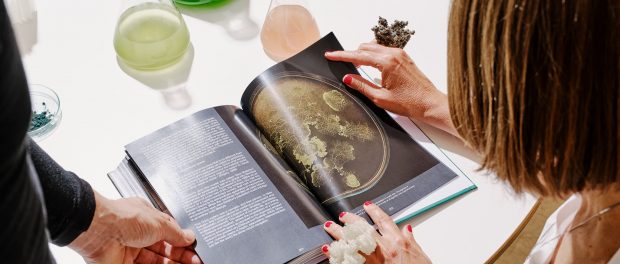Biodesign in the Age of Artificial Intelligence: Deep Green
ecoLogicStudio, the London-based architecture and design innovation firm specialized in biotechnology for the built environment founded by Claudia Pasquero and Marco Poletto, presents their new book entitled “Biodesign in the Age of Artificial Intelligence: Deep Green”.
Since 2005, the studio has built an international reputation for its innovative projects integrating systemic thinking, computational design, biotechnology and digital prototyping. ecoLogicStudio’s “broadened” approach to design, ranging from the micro to the global scales, is embodied in an experimental practice where each project becomes a laboratory, a true testbed for future models of inhabitation in the Urbansphere.
©Henry Woide
In the ten years since releasing their first book “Systemic Architecture: Operating Manual for the Self Organizing City”, ecoLogicStudio has evolved into a design innovation consortium, with close ties to internationally renowned academic institutions such as the University of Innsbruck, The Bartlett UCL in London, and the IAAC in Barcelona. The new volume illustrates this evolution by presenting a collection of the most significant projects completed in the period from 2012 to 2022, including Pasquero and Poletto’s practice-based PhDs.
The title encapsulates the three recurring themes in ecoLogicStudio’s research: the cutting-edge blue green masterplanning, biodesign applied to architecture and Artificial Intelligence as a medium for the design of future cities. Prof Mario Carpo puts the studio’s forward-thinking attitude in a nutshell:
Claudia Pasquero and Marco Poletto, while sharing my faith in post-industrial technologies, go one step further […]
©Henry Woide
The book invites us to think about Artificial Intelligence as a slime mould, a spider web, a microalgae colony or a mycelium network. Like these organisms, the architectures and the landscapes envisioned and built by ecoLogicStudio embody intelligence in their morphology, material behaviour and aesthetic appearance. Consequently, ecoLogicStudio proposes design innovations that do not seek to extract energy and raw resources from the planet. They grow and evolve through the re-metabolization of waste or the filtration of pollution, in what appears to be a constant regenerative process, a new kind of artificial circularity.
The 364-page volume is divided into two main parts. Following the delightful prologue by Sir Peter Cook, Part One, entitled PhotoSynthetica, proposes design solutions such as photosynthetic architecture, bio-digital sculptures and cyber-gardens in the public realm that engage the urban microbiome and seek to achieve immediate impact. The second part of the book, entitled Deep Green and masterfully wrapped up in the epilogue by Prof Mario Carpo, operates within a much larger spatio-temporal frame, going beyond human perception and lifespans, to envision synthetic landscapes and deep territorial planning.
©Henry Woide
At a time of catastrophic climate change, ecoLogicStudio has come to realize that change cannot simply be stopped or reverted and more positive dynamics should be established within the living world. To this end, the book proposes to engage with design as an extended cognitive interface, a sentient being that exists in co-evolution and symbiosis with the living planet, contributing to its beauty and continued enjoyment.
Perhaps inevitably, since it was written at the peak of a global pandemic, this book reveals the more intimate dimension of our work and the growing presence of our two children in its current development. Projects like BioBombola, BIT.BIO.BOT., AirBubble playground and inflatable eco-machine also reflect on the role of the family and the community in a creative practice. They test how design innovation enables radical lifestyle choices, both individually and collectively.
— conclude the founders of the studio.
©Henry Woide
Book title: Biodesign in the Age of Artificial Intelligence: Deep Green
Authors: Prof Claudia Pasquero and Dr Marco Poletto
Foreword: Sir Peter Cook
Afterword: Prof Mario Carpo
Academic contributions: A selected pool of researchers from the Synthetic Landscape Lab at Innsbruck University and from the Urban Morphogenesis Lab at the Bartlett UCL have been contributing to the book with four essays.
Publishing House: Routledge, 2023
Language: English
Page number: 364
Color illustrations: 150
Format: Hardback, paperback, eBook
Dimensions: 254mm x 178mm
Graphic design: www Stuudio

